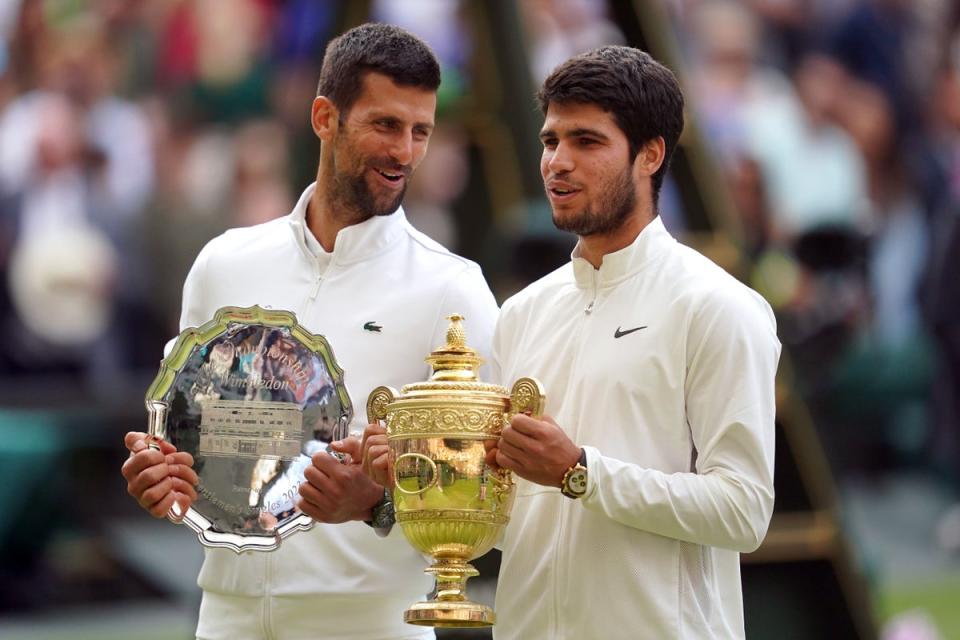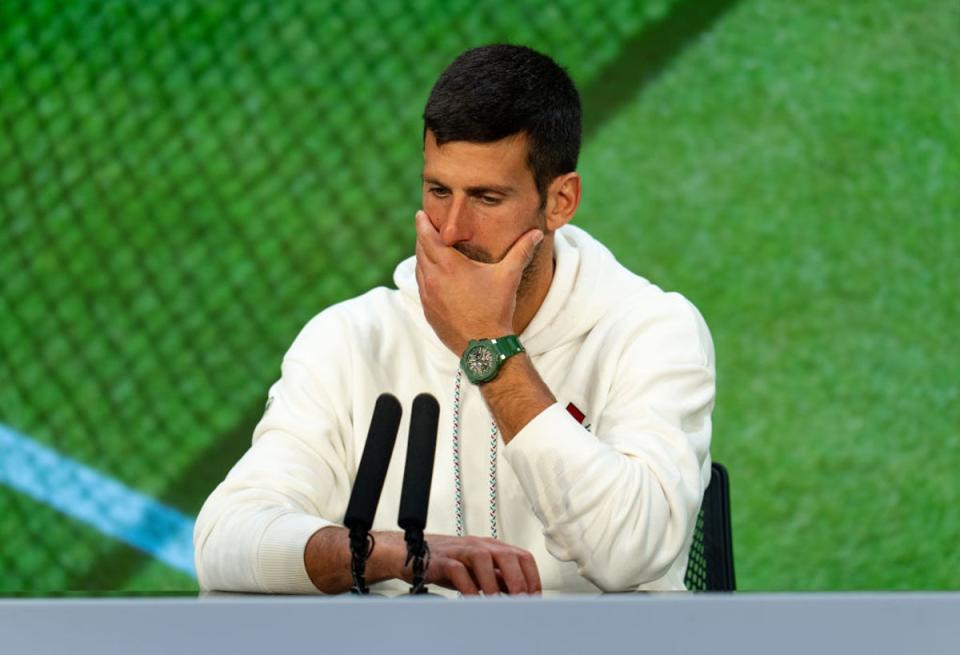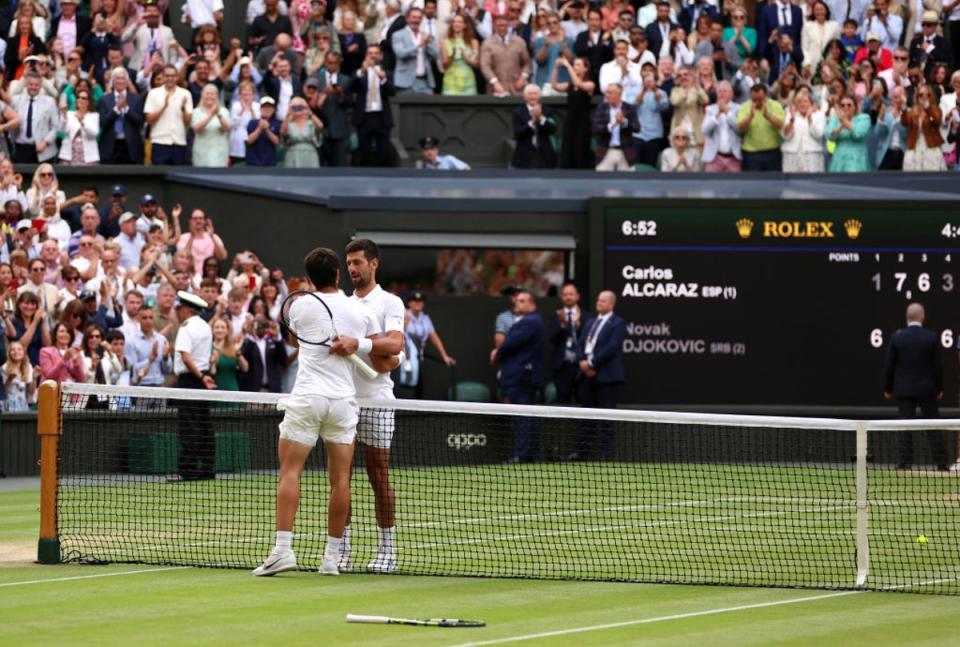Novak Djokovic has created a unique rival – is Wimbledon defeat the beginning of the end?
After the anger and the frustration came the sense and the perspective. Novak Djokovic’s winning run at Wimbledon was over and he had been beaten at his own game. Carlos Alcaraz not only triumphed in the battle of generations but in the contest of nerves and minds, prevailing in the fifth set of a Wimbledon final that will be remembered as one of the greatest ever played. Regrets? There were two: Djokovic allowed the second-set tiebreak to slip away, then when Alcaraz broke his serve in the fifth, Djokovic smashed his racket into the net-post. “It was a frustration in the moment,” he conceded. “Not much to say about that.”
But Djokovic accepted the result. “He was a deserved winner today, no doubt,” Djokovic said. After winning eight five-setters in a row, he believed a defeat was finally overdue. “I’ve won some epic finals that I was very close to losing,” he admitted. “Maybe this is kind of a fair-and-square deal.”
The defeat, though, hurts. At 36, and despite still being in remarkable physical condition, he does not know how many more chances he will have to equal Roger Federer’s men’s record of eight Wimbledon titles. Djokovic has redefined what can be achieved at his age and perhaps he will benefit from a change of approach next year. He will be 37 then, and with his winning run over, no longer invincible, he will have a clean slate and a fresh relationship with Wimbledon to embrace. With records to chase and grand slams to win, Djokovic will have no shortage of motivation.
The problem is Alcaraz. Djokovic was gracious in defeat, effusive in his praise, and honest when assessing the threat he now faces. “I haven’t played a player like him ever, to be honest,” he revealed, and he was including Roger Federer and Rafael Nadal.

Yet Alcaraz is also a rival Djokovic helped to create. Djokovic said Alcaraz had inherited elements of Federer, Nadal and himself, formulating a game that blended the strengths of the sport’s greatest champion, becoming a complete package. If Alcaraz’s explosion to the top of the game was behind Federer-style shot-making and creativity, combined with Nadal’s competitiveness and fight, then the finishing touch was Djokovic’s own mentality. “I think he’s got the best of all three worlds,” Djokovic continued.
As Alcaraz paraded the Wimbledon trophy on Centre Court before stepping out onto its iconic balcony, soaking in the love the people were showing for their new champion, it was hard to see the day as anything other than a symbolic moment, a changing of the guard. Alcaraz, a teenager two months ago, who grew up watching Djokovic overturn Federer and Nadal and become the most successful men’s player of all time, took on the 23-time grand slam champion stride for stride. Whereas before Djokovic held an imposing aura over the rest of the sport, taking pleasure in crushing the hopes and dreams of those who looked to replace him, Alcaraz’s victory could send a wave of belief that their moment could come, too.
“Well, I did it for myself, not for the [next] generation, honestly,” Alcaraz said. “Beating Novak at his best, in this stage, making history, being the guy to beat him after 10 years unbeaten on that court, is amazing for me. It’s great for the new generation, as well, I think to see me beating him and making them think that they are capable to do it.”
The challenge will be for Djokovic to rise again when time is running out. He laughed when asked if this was the beginning of another major rivalry. “I would hope so, for my sake,” Djokovic smiled. “He’s going to be on the tour for quite some time. I don’t know how long I’ll be around.” The arrival of a player like Alcaraz, who is wired so differently from anyone else who has come since Djokovic, Nadal and Federer, has changed the game.

Yet there is another world where the defining moment of Alcaraz’s year was not the Wimbledon final, but another match against Djokovic. Less than six weeks ago, Alcaraz faced Djokovic in the semi-finals of the French Open, in what was their first grand slam meeting. Alcaraz could not handle the occasion and after two competitive sets, the Spaniard’s nerves and the tension of playing Djokovic at a grand slam were too much for him. In a sport like tennis, where the spotlight is focussed so intensely on the individual, leaving no hiding place for any weakness or vulnerability, it was jarring to see Alcaraz show the first sign of what might have been his. Such moments can hang over players for years.
But how Alcaraz responded was in keeping with the ascent of the sport’s next superstar, a player who is evolving at an astonishing rate, faster than anyone could have imagined. Already the youngest world No 1 in history and a grand slam champion at 19, Alcaraz became a “different player” in the weeks between the French Open and the grass-court season. “I grew up a lot since that moment,” he said. From the nerves that cut down his thrilling game at Roland Garros, Alcaraz unlocked a mental balance that allowed him to beat Djokovic across five sets, doing to the Serbian what he had been doing to the rest of the sport for the past decade. In six weeks, he had learned to out-Djokovic Djokovic, and on grass.

“I must say he surprised me, he surprised everyone,” Djokovic admitted. Alcaraz has taken weeks to adjust to a surface that usually takes years to master. It is often said that the level required to win Wimbledon is higher than any other grand slam, due to the unique challenges grass presents and the short turnaround from the clay-court season. It was illustrated by the fact that only four players, Djokovic, Federer, Nadal and Andy Murray, had won the men’s singles title in 21 years. If Wimbledon was the ultimate test of talent, it was theirs that routinely rose to the top, denying a whole other generation of a taste.
That was until Alcaraz arrived, unafraid of the challenge, as his expectations shifted so suddenly. In his first match at Queen’s, Alcaraz survived a third-set tiebreak against the French lucky loser Arthur Rinderknech, the closest he came to losing a match on grass this season. From there, he won 11 matches in a row, unlocking parts of his game that saw him move from challenger, to contender, to champion.
“I must say the slices, the kind of chipping returns, the net play, it’s very impressive,” Djokovic said. “I didn’t expect him to play so well this year on grass, but he’s proven that he’s the best player in the world, no doubt.” And with that statement, Djokovic set himself a target that he will now begin to chase.

